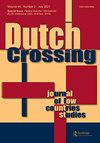The Imitation Game. Russian Pseudonyms and Pseudo-Translations in Dutch Literature
IF 0.4
3区 历史学
Q1 HISTORY
Dutch Crossing-Journal of Low Countries Studies
Pub Date : 2021-05-04
DOI:10.1080/03096564.2021.1943624
引用次数: 0
Abstract
ABSTRACT Pseudo-translations are a recurring phenomenon within literary history. This article examines three Dutch authors who, towards the late nineteenth and early twentieth century, opted for a Russian pseudonym. Using Jérôme Meizoz’ notion of posture, this article charts the trajectory of these literary scams and explores the rules of this imitation game through contextual, paratextual and textual evidence while also looking on the impact of these mystifications on the career of the respective authors. Finally, the works of the three fake Russians and their reception can also shed light on the place and prestige Russian literature held in the literary field of the Netherlands during a period in which Russian literature was less accessible than today.模仿游戏。荷兰文学中的俄语笔名与伪翻译
伪译是文学史上一个反复出现的现象。本文考察了三位荷兰作家,他们在19世纪末和20世纪初选择了一个俄罗斯笔名。本文使用Jérôme Meizoz的姿势概念,绘制了这些文学骗局的轨迹,并通过上下文,准文本和文本证据探索了这种模仿游戏的规则,同时也研究了这些神秘化对各自作者职业生涯的影响。最后,这三位冒牌俄国人的作品及其受到的接待,也可以揭示出俄罗斯文学在荷兰文学界的地位和威望,当时俄罗斯文学比今天更难接近。
本文章由计算机程序翻译,如有差异,请以英文原文为准。
求助全文
约1分钟内获得全文
求助全文

 求助内容:
求助内容: 应助结果提醒方式:
应助结果提醒方式:


